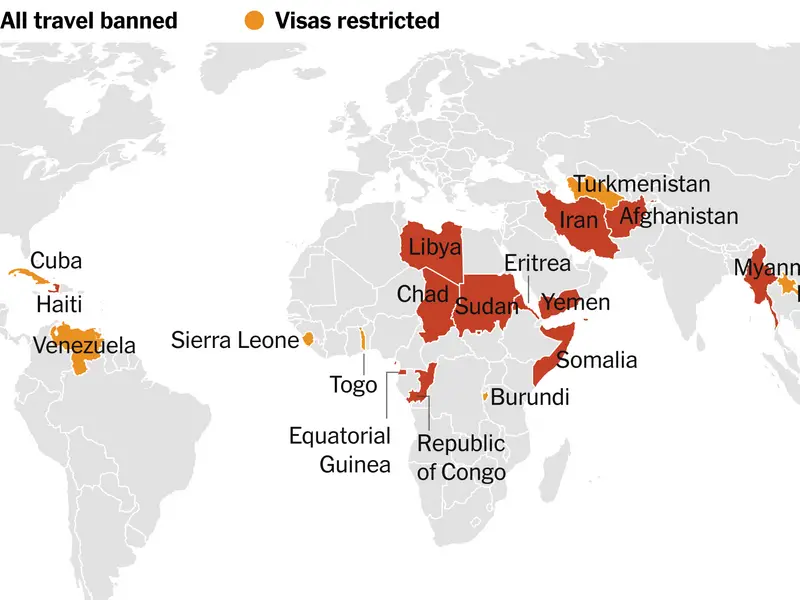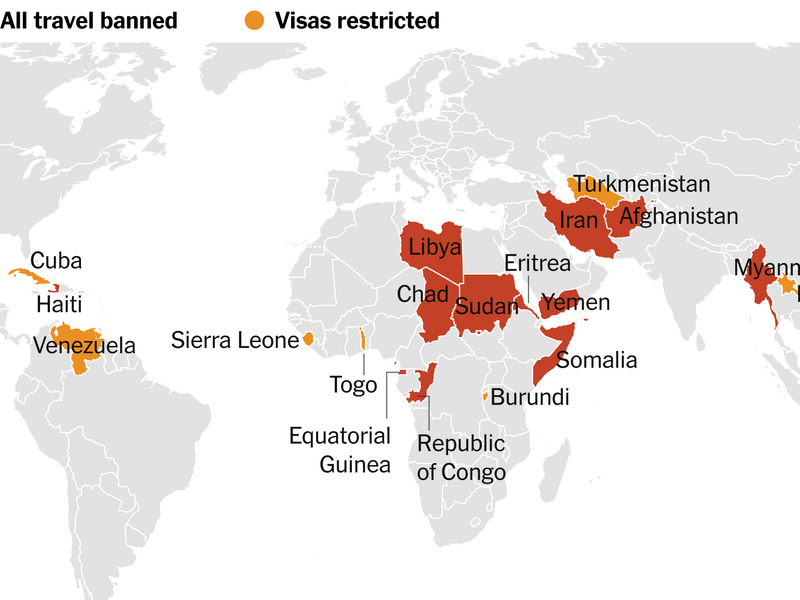Trump Travel Ban: The Symbol of American Imperialism
The Trump Travel Ban, introduced under the guise of national security, is fundamentally an extension of American imperialism. It targets vulnerable countries such as Afghanistan and Sudan, nations already grappling with political instability and economic hardship. Rather than protecting American citizens, this policy deepens existing inequalities and perpetuates the domination of the United States over weaker states.
Five Shocking Facts Behind the Ban
Firstly, the ban disproportionately affects refugees and immigrants from Muslim-majority countries, feeding into a broader narrative of xenophobia and exclusion. Secondly, the policy ignores the historical context of US involvement in these regions, where past interventions have contributed to the current crises. Thirdly, it disrupts the lives of thousands who seek safety and stability, often leaving families separated and communities in turmoil.
Impact on Afghanistan and Sudan
Afghanistan and Sudan bear the brunt of these policies more than any other countries. Afghanistan, still recovering from decades of war, faces further isolation from the international community. Sudan, plagued by internal conflict and economic collapse, sees its citizens further marginalized. The travel ban exacerbates the humanitarian crises in both nations by limiting access to asylum and international aid.
The Ban’s Role in US Foreign Policy Strategy
The travel ban serves as a strategic tool in US foreign policy, reinforcing power dynamics that favor American geopolitical interests. By restricting movement from certain countries, the US aims to control migration flows and maintain dominance over regions critical to its economic and military objectives. This policy also sends a clear message to these nations about their subordinate status in the global order.
Global Reactions and Criticism
Internationally, the ban has sparked widespread condemnation from human rights organizations, governments, and activists. Critics argue that it violates international law, undermines humanitarian principles, and fuels discrimination. Several countries have voiced their concerns, highlighting how such unilateral measures hinder global cooperation and damage the US’s reputation as a leader on human rights.
Human Stories Behind the Ban
Behind every policy, there are human stories of loss, hope, and resilience. Many individuals affected by the travel ban have faced prolonged separations from loved ones, lost opportunities for education and work, and endured psychological trauma. These personal narratives illuminate the real cost of policies driven by imperialistic motives and challenge policymakers to reconsider their approach.
Impact of the Travel Ban on Vulnerable Nations
The travel ban disproportionately targets countries already grappling with instability, poverty, and conflict. Nations such as Afghanistan and Sudan are caught in a web of systemic challenges exacerbated by these restrictive policies. The ban intensifies existing hardships by limiting access to asylum, education, and economic opportunities for their citizens. These restrictions not only hinder individual prospects but also impede the broader development goals of these countries.
Moreover, the ban creates a climate of fear and uncertainty among migrant communities. Families are torn apart as visa applications face delays or rejections, preventing reunification and destabilizing social networks that are essential for support in foreign lands. The cumulative effect is a deepening cycle of marginalization that reinforces global inequalities rather than addressing their root causes.
American Imperialism as the Underlying Driver
At the core of the travel ban lies a broader framework of American imperialism. The policy is less about national security and more about asserting control over strategic regions through economic and political pressure. By isolating certain countries, the US exerts influence, ensuring compliance with its foreign policy agenda. This imperialistic approach disregards the sovereignty of nations and often results in detrimental outcomes for their populations.
This dynamic is evident in how the US prioritizes its interests over humanitarian concerns, leveraging immigration controls as tools of coercion. The ban reinforces power imbalances, maintaining a hierarchy that privileges Western nations while marginalizing others. It also signals to the international community that dissent or non-alignment with US policies may invite punitive measures disguised as security protocols.
Global Solidarity and Resistance
Despite these challenges, global solidarity movements have emerged to resist the ban and advocate for the rights of affected communities. International coalitions comprising NGOs, activists, and sympathetic governments have mobilized to provide legal aid, raise awareness, and pressure policymakers to revoke or amend exclusionary measures. These efforts highlight the resilience and agency of marginalized populations in the face of systemic oppression.
Such movements underscore the importance of a united global response that prioritizes human rights over political agendas. They also emphasize the necessity for comprehensive immigration reforms that recognize the dignity and contributions of migrants worldwide. This growing resistance is a powerful counter-narrative to imperialistic policies, fostering hope for more just and inclusive international relations.
The Way Forward: Policy Recommendations
To address the harmful effects of the travel ban, policymakers must reconsider their approach, placing humanitarian values at the forefront. This involves lifting unjust restrictions, streamlining visa processes, and increasing support for vulnerable migrants. Enhanced diplomatic engagement with affected countries can promote stability and cooperation, reducing the root causes of forced migration.
Furthermore, transparent accountability mechanisms should be established to monitor the impact of immigration policies on human rights. Collaborative frameworks involving civil society, governments, and international organizations are essential to develop equitable solutions. Only through such inclusive strategies can the cycle of marginalization be broken, fostering global peace and security.
Impact of the Trump Travel Ban on Migrant Families
The Trump Travel Ban has separated numerous migrant families, causing emotional distress and uncertainty. Many families face long waiting periods and barriers to reunification due to this policy.
Economic Effects of the Trump Travel Ban
The Trump Travel Ban negatively affects economies, particularly in targeted countries. Restrictions on travel hinder trade, investment, and remittances, which are vital for the growth of vulnerable nations.
Legal Battles Against the Trump Travel Ban
Several legal challenges have been filed against the Trump Travel Ban, arguing that it violates constitutional and international laws. Courts continue to examine the ban’s legality and its broader implications.
Public Response to the Trump Travel Ban
The Trump Travel Ban has sparked widespread debate and protest. Many communities and activists view it as discriminatory and unjust, calling for its repeal and more inclusive immigration policies.
Conclusion
The travel ban exemplifies how policies driven by American imperialism have far-reaching consequences beyond their stated security objectives. It disproportionately affects vulnerable nations like Afghanistan and Sudan, deepening inequalities and undermining international human rights standards.
However, the growing resistance from global solidarity movements offers a beacon of hope, calling for more compassionate and just immigration policies.
Moving forward requires a fundamental shift in how immigration and foreign policy intersect, emphasizing respect for sovereignty, human dignity, and global cooperation. By addressing these challenges collectively, the international community can work towards dismantling oppressive systems and building a future where migration is managed with fairness and empathy.

For more on immigration policies and their global impact, visit our in-depth analysis on Voice Mauritius News.
Source: The Guardian




